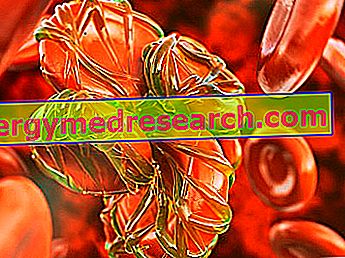Related articles: Sjögren syndrome
Definition
Sjögren's syndrome is a systemic inflammatory disease. It is a chronic autoimmune disease, characterized by the destruction of various exocrine glands (salivary, lacrimal and others), mediated by T lymphocytes (CD4 +) and some B cells. It follows a progressive dysfunction of the glands concerned.
The exact etiology is unknown, however Sjögren's syndrome appears to be associated with a genetic predisposition. Furthermore, it can occur in patients suffering from other autoimmune diseases, such as rheumatoid arthritis and systemic lupus erythematosus (SLE).
Most common symptoms and signs *
- ageusia
- Halitosis
- Asthenia
- Dry mouth
- Burning eyes
- Burning to the tongue
- Kidney stones
- Conjunctivitis
- Decreased sweating
- Dysphagia
- dysgeusia
- Pain during sexual intercourse
- Articolar pains
- Eosinophilia
- Hepatitis
- Tingling in the hands
- Tingling in the legs
- Fotofobia
- Glossitis
- Dry throat
- Parotid enlargement
- hypohidrosis
- Tearing
- Leukopenia
- Inflated tongue
- Black tongue
- Red tongue
- Livedo Reticularis
- Paresthesia
- Dry skin
- Polyuria
- Vaginal itching
- Rheumatism
- Mouth Metal Flavor
- Nasal dryness
- Eye dryness
- Vaginal dryness
- Raynaud's syndrome
- Nephrotic syndrome
- Cough
- Brittle nails
- Pericardial effusion
Further indications
The characteristic symptoms of Sjögren's syndrome often arise in the eyes and mouth. Dry eyes (xerophthalmia) can cause irritation and photosensitivity; in advanced cases, these eye disorders may develop into dry keratoconjunctivitis and keratitis (corneal inflammation). The decrease in salivary secretion (xerostomia), on the other hand, results in difficulty chewing and swallowing food, reduced taste and smell, Candida infection and tooth decay. Sjögren's syndrome can also cause fatigue, joint pain, swelling of the parotid glands and dryness of the skin, mucous membrane of the nose and genital organs.
Dry airways can cause coughing and complication in bronchitis. Subsequently, other organs and apparatuses adjacent to, or connected to, the exocrine gland can be affected (even if not properly formed by glandular tissue). For example, the gastrointestinal tract, the kidneys, the joints, the central and peripheral nervous system may be involved. The extra-glandular manifestations of Sjögren's syndrome include paresthesia, kidney stones, vasculitis, lymphoma, kidney failure, chronic hepatobiliary diseases (hepatitis and primary biliary cirrhosis) and pancreatitis.
The diagnosis is based on specific criteria that demonstrate the involvement of the eyes, mouth and salivary glands. The autoimmune response is found with the search for autoantibodies in patient serum and from the analysis of histopathological findings.
Sjögren's syndrome therapy is symptomatic and initially involves the use of topical preparations for dryness (eg ocular lubricants). The treatment of extra-glandular manifestations depends fundamentally on the organ involved.



